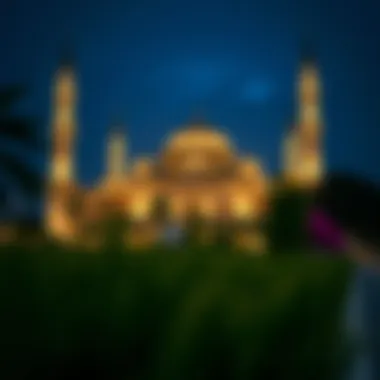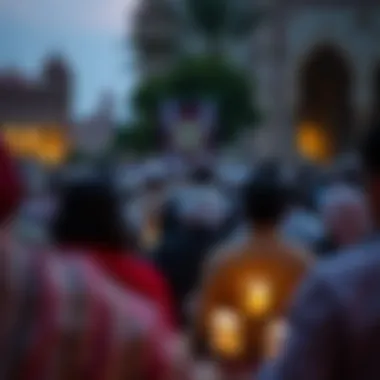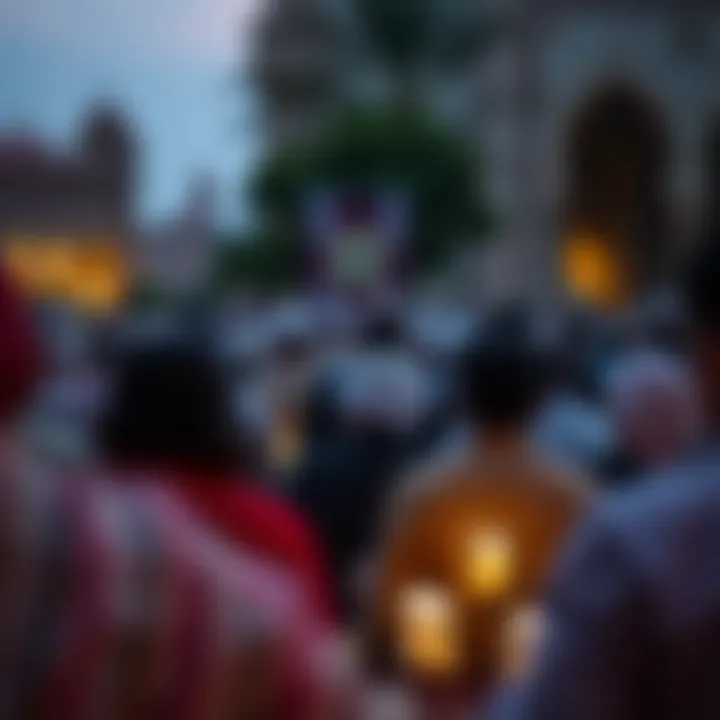Ramadan 2024 Time Table: Fasting and Reflection Guide


Intro
Ramadan is more than just a month of fasting; it’s a time for spiritual rejuvenation, community bonding, and cultural reflection. As 2024 approaches, many will begin to prepare for one of the most significant periods in the Islamic calendar. This article aims to navigate through the intricate details of Ramadan, particularly focusing on the time table for 2024. Individuals will find valuable insights into daily prayer schedules, fasting hours, and how to blend these observances with the bustling lifestyle often present in cosmopolitan cities like Dubai.
The essence of Ramadan lies in its ability to foster introspection and unity within communities. With the holy month’s arrival, individuals from various backgrounds come together, sharing in the experience of fasting and prayer. However, beyond its spiritual significance, the month also weaves a rich tapestry of cultural practices and communal activities that vary across different regions.
As this article unfolds, readers will gain an understanding of the time table for 2024, along with essential information on how to harmonize the observances of Ramadan with daily life—an especially pertinent consideration for those living in dynamic urban settings.
Let’s embark on this exploration and understand what Ramadan 2024 holds in store.
Preface to Ramadan
Ramadan is a month enveloped in significance for millions worldwide. As a period dedicated to fasting, prayer, and reflection, it is crucial to understand the depth of its importance, both historically and religiously. This article will unpack the many facets that comprise Ramadan, providing a well-rounded narrative that merges past and present influences. By exploring this sacred month, readers can appreciate how these traditions shape not only spiritual practices but also daily life across diverse cultures.
One does not merely approach Ramadan as an observer; for many, it amounts to a heartfelt commitment to spiritual reawakening, communal presence, and charity. It offers an opportunity to step back, to reconsider one's actions and beliefs, and to strengthen ties with both community and faith.
Ramadan isn’t just about abstaining from food; it's about feeding the soul, cultivating empathy, and thriving in a collective experience that uplifts everyone involved.
In the following sections, we’ll delve deeper into the historical significance of this month and what it represents within the wider context of religious obligations and celebrations.
Historical Significance
The roots of Ramadan go deep into history, intertwining with the moments that define Islamic identity. The month commemorates the Revelation of the Quran to Prophet Muhammad, a pivotal incident that occurred during the sighting of the crescent moon marking the start of Ramadan. This event, which holds profound relevance, serves as a reminder of the divine guidance bestowed upon humanity.
In historical terms, the practices during Ramadan set the stage for various cultural developments. Beyond just fasting, it encouraged the flourishing of scholarship and unity among communities. During this time, the collective fasting brought people together, married cultural heritage with religious observance. Rather than simply a ritual to honor faith, Ramadan transformed into a medium for historical narration, shaping how societies respect and evolve their customs.
Religious Importance
The religious significance of Ramadan can hardly be overstated. Fasting during this month is one of the Five Pillars of Islam – the core beliefs that define the faith. It isn't merely an act of physical restraint; it embodies a comprehensive framework for spiritual growth. By abstaining from food and drink from pre-dawn until sunset, Muslims practice self-discipline, experience spiritual cleansing, and foster a profound connection with God.
Moreover, Ramadan serves as a phase for heightened devotion. Increased frequencies of prayer, recitation of the Quran, and engaging in acts of charity are essential parts. These practices nourish the soul, reinforce faith while encouraging individuals to seek forgiveness and generously give back to those in need. The month is also filled with opportunities for inter-community connection through charitable endeavors, driving home the importance of solidarity and empathy.
In essence, understanding Ramadan requires more than a surface-level glance. It invites a deeper exploration into how history and spiritual obligations intertwine, laying the foundation for a month that serves millions as both a fast and a feast for the spirit.
Overview of Ramadan
The period of Ramadan is a significant time for Muslims around the world, and understanding its features in 2024 offers insights into its practices, expectations, and communal spirit. This year, Ramadan is expected to begin around March 10 and continue till approximately April 8, but the actual start can depend on the sighting of the moon. Familiarity with these dates is essential, not only for adherence to fasting but also for planning community events and prayer schedules.
Navigating the month of Ramadan with all its rituals can enhance both personal spirituality and community ties. With expected dates marking the commencement and conclusion of fasting, individuals can prepare mentally and physically. This preparation is particularly crucial in bustling urban environments where daily life is fast-paced, as it allows people to adjust their schedules, be it for work or family commitments, ensuring their participation in religious and cultural gatherings.
Expected Dates
In 2024, as Ramadan approaches, many anticipate its start based on lunar cycles. The expected dates for Ramadan are:
- Beginning: Evening of March 10 or 11 (confirmation based on moon sighting).
- End: Evening of April 8 or 9, with Eid al-Fitr to follow.
This month-long journey of fasting and reflection is set against the backdrop of a diverse array of cultures and practices, particularly noticeable in urban settings like Dubai. Each day brings its own set of experiences, and the importance of being aware of these changes in routine cannot be understated. It enables families to gather for Suhoor and Iftar, drawing them together in shared responsibilities and a deep sense of community.
Global Observance
While Ramadan is a month celebrated universally by Muslims, the observance varies widely around the globe. In metropolitan areas, local governments often adjust opening hours to accommodate fasting schedules. That means shops, schools, and businesses will have varied schedules during this time.
Key Observances Include:
- Charitable Acts: Many engage in acts of kindness, giving to those in need. This practice deepens the spiritual aspect of Ramadan.
- Prayer Gatherings: Mosques are usually bustling with individuals congregating for evening prayers, establishing a wonderful sense of brotherhood and sisterhood within the community.
- Culinary Traditions: In different countries, unique culinary traditions emerge as families prepare their Iftar meals, creating a beautiful tapestry of flavors. Whether it’s dates and water in Saudi Arabia or samosas in Pakistan, these culinary delights form a part of cultural identity and celebration.
As Ramadan unfolds, being aware of these global observance nuances can enhance an individual’s journey, offering opportunities for personal reflection and shared experiences with others. This comprehensive understanding of what to expect and how to engage during Ramadan 2024 can ultimately lead to a richer, more fulfilling spiritual experience.


Daily Fasting Schedule
Fasting during Ramadan is not just about abstaining from food and drink; it’s a comprehensive exercise in discipline, spirituality, and community. The Daily Fasting Schedule lays down the framework for how individuals observe this month, guiding their daily routines, promoting reflection, and fostering a deeper connection to their faith. Each aspect, from pre-dawn meals to evening feasts, plays a critical role in shaping the experiences and expectations of Muslims around the globe.
Pre-Dawn Meal (Suhoor)
Suhoor serves as a crucial meal before the day of fasting begins. It is typically consumed in the early hours before dawn, providing energy and sustenance for the day ahead. Not only is it a physical necessity, but it also holds spiritual significance.
Eating a well-balanced Suhoor can help individuals maintain their energy levels during fasting hours, allowing them to focus on their prayers, reflections, and daily tasks without succumbing to fatigue. Some popular Suhoor choices include yogurt, eggs, and whole grains, as they provide lasting energy.
Moreover, this meal encourages family bonding, as many gather around the table to eat together before the first light of dawn. Thus, Suhoor becomes both a moment of nourishment and a time for deepening familial ties.
Breaking Fast (Iftar)
The Iftar, the meal to break the fast, represents not only the end of a day-long fast but also a communal celebration. Traditionally broken with dates and water, Iftar serves as a reminder of the simple blessings often taken for granted. This meal is filled with a variety of dishes, reflecting local cuisines and cultural backgrounds.
Gathering for Iftar is profoundly significant in many communities; it offers an opportunity to share and connect with friends and family. Many also invite neighbors, thereby fostering a sense of togetherness, the spirit of generosity, and empathy. In vibrant cities, elaborate public Iftars often occur, celebrating the joy of sharing meals amid diverse cultures.
Daily Time Table for Fasting
The Daily Time Table for Fasting provides a structured outline that guides Muslims on when to begin and end their fast. It varies from one region to another, but generally follows the natural rhythms of dawn and sunset.
Cities Overview
Cities have their own unique fasting schedules influenced by geographical location and local Islamic practices. For example, places like Cairo and Doha might have slightly different fasting times due to their latitudinal positioning. This aspect makes the daily schedule a personalized affair, allowing individuals to align their fasting with their local environment. Besides, knowing the exact timings helps in planning meals and daily activities effectively.
One standout characteristic of the Cities Overview is the way different cultures celebrate Iftar. For instance, in Istanbul, it’s common to witness neighborhoods filled with people eagerly awaiting the call to pray, creating an atmosphere of excitement and unity. These local peculiarities enhance the overall experience of Ramadan, serving as a rich tapestry of traditions, connected through a common practice.
Local Variations
The Local Variations in the fasting timetable account for differences in regional practices, time zones, and seasonal changes. In countries like Indonesia and Malaysia, local customs play a substantial role in shaping how Suhoor and Iftar are observed, often influenced by historical and cultural factors.
This aspect of Ramadan highlights the benefit of adaptability, allowing communities to harmonize the practice within their specific contexts. Families may choose to share traditional dishes unique to their heritage, thus enriching the shared experience among expatriates and locals alike.
It’s important to be aware of these local variations as they can impact not just your spiritual practice but also your interactions with those around you. Respecting these differences can enhance community engagement during this blessed month.
Prayer Times During Ramadan
The significance of prayer during Ramadan cannot be overstated. It is not just a ritual; it is the very essence that anchors the observant in the spiritual journey they undertake throughout the month. Each prayer serves not only as a means of connecting with the divine but also as a structured point of reflection amidst the broader context of fasting and communal interactions. Given the fasting regime, timing becomes essential, as these moments provide not just breaks in fasting but also opportunities for soul-searching and community bonding.
Significance of Prayer in Ramadan
Prayer, or Salah, takes on heightened importance during Ramadan. It acts as a source of strength and clarity amid the bodily fasting and spiritual striving. Muslims believe that during this month, the rewards for each prayer are multiplied significantly. This enhances the motivation to maintain consistency; many find new depths in their connection to faith and community during this period. The act of coming together for these prayers helps foster a sense of unity among the believers, transcending the individual experience. Moreover, it provides a rhythm to the month, delineating time not just for reflection but also for communal engagement.
Daily Prayer Schedule
The daily prayer schedule during Ramadan is a vital element of religious life, ensuring that believers remain connected to their spiritual obligations while navigating the complexities of fasting. This schedule is made up of five distinct prayers taken throughout the day, each with its own unique significance and timing.
Fajr
Fajr, the pre-dawn prayer, carries profound weight as it marks the beginning of the daily fast. It provides a serene moment for believers to reflect before the hustle of the day begins. Key characteristic: Fajr is performed before sunrise, which enhances its spiritual depth as worshippers rise early to connect with their faith. Its importance is amplified during Ramadan, as it sets a tone of devotion and discipline for the entire day. The unique feature of Fajr is its stillness; practicing it opens a quiet space for gratitude and intention that resonates throughout one’s fasting day. This prayer is advantageous as it prepares the heart and mind for the challenges that lie ahead.
Dhuhr
When the sun has passed its zenith, Dhuhr becomes the midday prayer, providing a necessary break from the day’s activities. Key characteristic: Dhuhr invites congregational prayers, enabling community participation. For many, this prayer serves as a much-needed pause in their fasting journey to recharge spiritually and physically. Its unique feature is the communal aspect; coming together for this prayer strengthens bonds between worshippers. However, it can occasionally become a challenge for those working during peak hours, creating a need for careful timing considerations.
Asr
Asr represents the afternoon prayer, which falls when the day is well underway. Key characteristic: It often comes when one’s energy may begin to wane, making it a moment to regain focus and resolve. Asr serves to remind worshippers of the passing of time, pushing them to reflect on their fast and intentions. Its unique feature is the flexibility in its timing, which allows believers in varying circumstances to slip into prayer as needed. Additionally, its occurrence can sometimes clash with work responsibilities, encouraging prioritization of faith over mundane tasks.


Maghrib
Maghrib, the evening prayer, is particularly special because it coincides with breaking the fast. Key characteristic: This prayer is universally anticipated as it marks the end of the day’s fasting. It creates a sense of community, as families and friends gather to share a meal whilst engaging in prayer together. Its unique feature is the sensory experience tied to Iftar; many find that breaking their fast with Maghrib prayer enhances the joy of the meal. This dual aspect makes Maghrib one of the most cherished prayers of the day, though its timing needs attention as it falls right at sunset.
Isha
Isha is the night prayer, capping off the day's spiritual obligations. Key characteristic: It often includes the Taraweeh prayers, which hold special significance in Ramadan, making it an important nightly event. Isha serves as a moment of reflection and serenity, allowing worshippers to end their day in praise and gratitude. Its unique feature is the extended prayers, which can sometimes lead to long nights, hence requiring careful energy management and planning. Therefore, while Isha can be a challenge for some, it provides deep spiritual benefits, reinforcing the cycle of worship established throughout Ramadan.
Cultural Practices and Traditions
Ramadan is not just a month of fasting; it’s a rich tapestry of cultural practices and traditions that bring communities together. The significance of these customs often enhances the spiritual experience, as family and friends unite to observe this holy month. Amid the fasting and prayers, these cultural elements provide a sense of continuity and connection that resonate through generations.
Community Gatherings
Community gatherings during Ramadan are a cornerstone of the observance. Families often come together with loved ones to share meals at Iftar, the meal to break the fast at sunset. Beyond the family circle, mosques become vibrant hubs for communal prayer and fellowship.
It's common for community centers to organize large Iftar events, inviting everyone, regardless of their cultural background, to partake in the breaking of the fast. This practice not only symbolizes unity among Muslims but also fosters understanding and goodwill among diverse segments of society. Through such gatherings, the spirit of Ramadan extends beyond mere fasting to include an invitation for dialogue and intercultural exchanges.
- Creating a Sense of Belonging: Joining communal prayers or meals alleviates feelings of isolation. For many expatriates, especially those far from home, these gatherings help to cultivate a sense of belonging, reinforcing social bonds in a new environment.
- Culinary Diversity: Each community boasts its own unique dishes for Iftar. In Dubai, for instance, one might find dates alongside a myriad of international cuisines, reflecting the cosmopolitan nature of the city. Sharing dishes can create a tapestry of flavors and traditions that enhance the communal experience.
- Spiritual Reflection: Shared rituals allow for collective contemplation. As participants gather for prayers or discussions about the significance of Ramadan, these shared moments of spirituality create deeper connections and a profound sense of community.
Charitable Acts
Charitable acts, or Zakat, form another essential aspect of Ramadan, emphasizing the month’s spirit of generosity and compassion. This period is often seen as an opportune time to support those less fortunate, fulfilling one of the five pillars of Islam—charity. Various organizations and individuals ramp up their charitable activities in Ramadan, which can take many forms.
- Food Distribution: Many choose to organize food drives to distribute meals to the needy. Notably, organizations like the Dubai Charity Association often host large-scale events to ensure that everyone has access to food during Iftar. Such acts not only provide nourishment but also foster a spirit of community and solidarity.
- Financial Donations: Many Muslims calculate their Zakat, giving a specified percentage of their wealth to those in need, often directing these contributions to local charities or community initiatives during Ramadan. This charitable spirit underscores the commitment to support those struggling within the community.
- Volunteering Time: Beyond financial contributions, many individuals volunteer their time at shelters and food banks, reaffirming the importance of community service. This hands-on approach enables individuals to personally connect with those they are helping, strengthening social ties and understanding within the community.
"Ramadan is not merely a time of restraint; it is about renewing connections, both with ourselves and with those around us."
For more information on Ramadan's cultural significance, visit Wikipedia or Britannica.
Impact on Lifestyle in Dubai
Ramadan, the month of fasting and reflection, carries a profound impact on the daily life of residents in Dubai. The cultural fabric of this vibrant city shifts subtly during this sacred month, as people from various backgrounds come together to observe the traditions and practices associated with fasting. In a place known for its diversity, the observance of Ramadan adds a layer of communal spirit and solidarity that permeates throughout. Understanding this dynamic means recognizing the adaptation required in everyday schedules, especially regarding business and social activities.
Business Hours
One of the most notable changes during Ramadan in Dubai is the adjustment of business hours. Typically, firms, shops, and government entities adapt their operating times to accommodate the fasting schedule. Most businesses open later in the morning and close earlier in the afternoon, which reflects the altered rhythms of life during the month. For example, while a standard workday in Dubai usually runs from 9 AM to 5 PM, during Ramadan, many offices operate from around 10 AM to 4 PM. This approach allows employees to fulfill their fasting obligations while still attending to work responsibilities.
This shift in business hours doesn't just affect work schedules; it also impacts the overall traffic flow in the city and the timing of public services. Tourists and expats may find themselves navigating different shopping and dining timings, as many restaurants don’t serve food during daylight hours and only open after sunset. This can be an adjust to new arrivals, making it essential to plan ahead and accommodate the local customs.
As a tip, it’s wise for newcomers and visitors to check the Ramadan-specific opening times of businesses they intend to visit. These changes are often well-advertised but can lead to confusion for those unfamiliar with the local customs.
Social Activities
Social activities in Dubai take on a unique character during Ramadan. Evening gatherings flourish as families and friends come together to break the fast, known as Iftar. This meal marks not just the end of fasting for the day, but also serves as a point of reconnection and fellowship among community members. Restaurants often offer special Iftar menus, featuring an array of traditional dishes, which encourages more social dining experiences throughout the month.
In the spirit of community, many neighborhoods organize mass Iftar gatherings in parks and open spaces. These events are a staple in Dubai and allow residents, expats, and even tourists to experience the warmth of local hospitality while sharing meals with one another. This acts not only as a wonderful cultural experience but also as an opportunity to build relationships across different backgrounds.
Furthermore, charitable initiatives ramp up during Ramadan. It’s a time when many focus on giving back, leading to an uptick in volunteer activities and charity drives. The idea of helping those less fortunate resonates deeply during this month of reflection and is reflected in the numerous community events designed to raise funds or collect donations for a good cause.
Overall, Ramadan in Dubai creates a special ambiance where the pace of life slows down, and community ties strengthen. Understanding these nuances of lifestyle during this month allows expats and newcomers to blend in more harmoniously while respecting local traditions and customs. Everyone has a role to play in this cultural exchange, making Ramadan not just a period of fasting but a significant milestone of social and spiritual enrichment.
Adapting to Ramadan as an Expat
Navigating the cultural and religious landscape of Ramadan can be an enlightening yet challenging experience for expatriates. Understanding the local customs and traditions is essential for fostering respect and building connections within the community. For expats in regions with a high Muslim population, like Dubai, becoming familiar with Ramadan practices can deepen the experience of this sacred month.
Understanding Local Customs
Local customs during Ramadan vary significantly from one culture to another, yet some elements remain core to the experience across many Muslim communities. One fundamental characteristic of this month is the communal sense of spirituality it brings. Expatriates should be aware of the collective significance placed on fasting, prayer, and community involvement.


The spirit of Ramadan often manifests in public displays of generosity and hospitality. Many local establishments offer special Iftar menus, inviting the community to break fast together. Understanding these practices enhances an expat’s connection to both the religious and social dynamics of their new home. It's also noteworthy that being mindful of the fasting hours — from pre-dawn until sunset — is crucial. This is a time when many locals refrain from eating, drinking, and even smoking in public.
Tips for Newcomers
Respecting Fasting Hours
Respecting fasting hours is not just a matter of politeness; it shows an understanding of the culture and respect for its values. During this sacred month, many Muslims abstain from food and drink from dawn until dusk, and this includes refraining from intense physical activity. Not adhering to these guidelines can cause discomfort and may come across as disrespectful.
Key aspects of respecting fasting hours include:
- Adjusting your daily routine: Plan meetings and social events after sunset, when fasting has ended.
- Avoid eating or drinking in public spaces: Even if you’re not fasting, try to understand the sentiment behind this practice.
This respectful choice allows for smoother interactions and shows a commitment to engaging with the local culture responsibly.
Participating in Community Events
Participating in community events during Ramadan not only helps expats feel integrated but also allows for a genuine connection with their neighbors. There are numerous charitable events and social gatherings during the month. Joining in can enhance one's understanding of the communal spirit that defines Ramadan.
The unique feature of engaging in these events is that it creates bonds with local citizens and fellow expatriates alike, contributing to a wider sense of belonging.
Advantages of participating include:
- Learning opportunities about local customs and traditions while forming valuable relationships.
- Contributing to charity: Many expats find immense fulfillment in giving back, especially during a month devoted to generosity.
"Fasting is a shield, it will protect you from the fire and prevent you from sin." - Prophet Muhammad (PBUH)
Exploring these aspects can turn an experience into a meaningful exchange rather than just an observation, firmly rooting expats within the lively and structured celebration of Ramadan.
Health Considerations During Ramadan
Ramadan is not just a spiritual journey but also a test of physical endurance. For many, the month of fasting comes with its own sets of challenges. Understanding health considerations is pivotal to navigate this period effectively. From nutritional balance to managing workload and keeping up energy levels, each aspect plays a role in ensuring that one honors the spirit of Ramadan while maintaining well-being.
Nutritional Tips for Fasting
During Ramadan, when one refrains from food and drink from dawn until sunset, it becomes crucial to pay attention to what and how we eat. A well-rounded diet can make a world of difference. Here are some practical tips:
- Balance is Key: Focus on incorporating a variety of food groups. Include lean proteins from chicken or fish, complex carbohydrates from whole grains, and plenty of fruits and vegetables. This balance helps sustain energy levels through the fast.
- Hydration Strategy: Between iftar and suhoor, drink plenty of fluids. Aim for at least eight glasses of water, ensuring hydration without excessive caffeine or sugary drinks, which can lead to dehydration.
- Mindful Eating: It’s easy to overindulge at iftar after a day of fasting. Start with dates and water, as traditionally practiced, then move on to a hearty meal. Listen to your body and eat slowly to help with digestion.
- Healthy Snack Options: If you plan to have snacks, consider nuts, yogurt, or fresh fruits. These options provide essential nutrients without overwhelming the system.
Maintaining a balanced diet during fasting days helps not only in physical health but also enhances focus for prayers and reflections. It’s a common myth that one needs to eat in excess to cope with fasting; rather, quality over quantity should guide choices.
Managing Workload During Fasting
Fasting while juggling work responsibilities can be tricky. Recognizing how to manage your workload effectively is essential. Here are some recommendations:
- Adjust Your Schedule: If possible, shift your work hours to start earlier or later in the day, aligning with fasting hours. Working during peak heat and hunger can drain energy quickly.
- Prioritize Tasks: Identify tasks that require more concentration and tackle those during the time you feel most alert, which might be right after iftar. Less demanding tasks can be saved for periods of lower energy.
- Take Breaks: Short, frequent breaks throughout the day can help recharge focus and stamina. Use this time for light stretches or deep breathing to alleviate fatigue.
- Communicate With Your Team: If you’re an expat or a newcomer, it’s beneficial to openly discuss Ramadan with your colleagues. This enhances understanding and fosters a supportive work environment, allowing for flexibility in responsibilities.
"Embracing a practical approach during Ramadan not only enhances your own experience but also allows you to nurture a harmonious workplace culture."
In summary, health considerations during Ramadan are crucial for a fulfilling and spiritually enriching experience. Balancing nutritional needs and adapting workloads allows individuals to make the most out of this significant month, setting a robust foundation for both faith-based practices and daily responsibilities.
Epilogue
In the context of this article, the conclusion serves as a reflective lens through which one can appreciate the multitude of benefits and meanings that come with Ramadan. This month is not just about abstaining from food and drink; it's essentially a time for deep spiritual renewal and communal solidarity. One can feel the vibrancy in the air, especially in a city like Dubai, where the juxtaposition of modernity with rich traditions becomes a backdrop for this sacred period.
Reflection on Ramadan's Meaning
Ramadan goes well beyond fasting. It is a period for introspection, self-discipline, and connection with the divine. For many individuals, this month signifies an opportunity to reflect on their own lives, their relationships, and their spiritual journey. It's a time of purification, where one examines actions, renews faith, and seeks to fortify bonds with family and the broader community. As people gather to share meals at iftar or engage in nightly prayers, they become more attuned to each other's struggles and strengths.
The act of fasting itself is rich with meaning. It is a means of self-reflection, representing a struggle against one's own desires. This nurturing of the spirit extends into acts of charity and kindness, sowing the seeds for a more equitable society. In a way, Ramadan encourages individuals to put themselves in the shoes of the less fortunate. It does not merely emphasize sacrifice; it embodies generosity, empathy, and a longing for communal well-being.
Looking Ahead to Future Observances
As we ponder on future observances of Ramadan, the anticipation stirs a sense of hope and communal unity. Each year brings its unique challenges and opportunities, affected by social changes and global dynamics. One can expect advancements in technology to further enrich the communal experience. For instance, apps specifically designed for Ramadan practices may serve to enhance prayer schedules or fasting tips, allowing for a more connected experience.
Moreover, as more expatriates come to reside in cities like Dubai, we can expect the cultural tapestry to grow richer. This can lead to a blend of traditions that enhances communal engagement, infusing Ramadan with new rituals that reflect a diverse society. Importantly, as globalization continues to mold our lives, the essence of Ramadan—compassion, unity, and reflection—remains timeless, inviting people from all walks of life to participate and immerse themselves in the spirit of the month.



